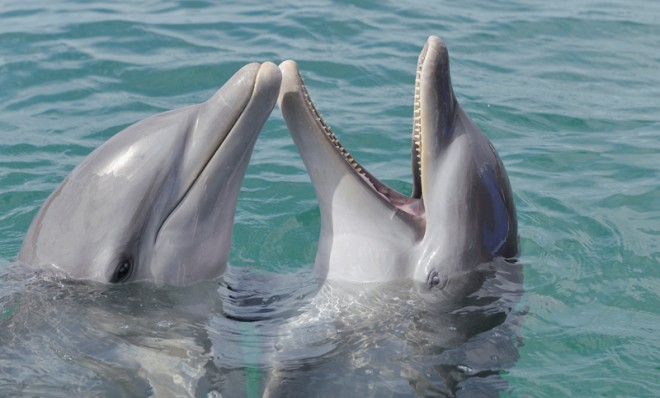Oh hey, Flipper: How dolphins may give each other names
It begins with a whistle

A free daily email with the biggest news stories of the day – and the best features from TheWeek.com
You are now subscribed
Your newsletter sign-up was successful
Fiercely intelligent and remarkably social, bottlenose dolphins may assign one another unique "signature whistles" that act as names, according to a new study.
Since the 1960s, animal researchers have theorized that dolphins may use these whistles to identify one another while grouped together in complex pods, building on the fact that captive dolphins respond to the whistles of other dolphins pals they already know.
New research published this week in the Proceedings of the National Academy of Sciences bolsters that theory. A team of scientists discovered that wild dolphins actually respond to the name-whistles with their own unique whistles, as if to say, "Hey, what's up?" Kind of like Pokémon.
The Week
Escape your echo chamber. Get the facts behind the news, plus analysis from multiple perspectives.

Sign up for The Week's Free Newsletters
From our morning news briefing to a weekly Good News Newsletter, get the best of The Week delivered directly to your inbox.
From our morning news briefing to a weekly Good News Newsletter, get the best of The Week delivered directly to your inbox.
National Geographic explains:
The research was performed by a group of scientists on a boat off eastern Scotland who joined up with a group of wild dolphins. When one of the dolphins announced itself with its signature whistle — the equivalent of "Joey!" for instance — the researchers recorded that sound.
Later, the team played that same "Joey!" call back to the dolphins, and a significant portion of the time, the dolphin they called Joey responded with the same call — as if Joey was saying, "Yup, I'm here." [National Geographic]
The scientists also tried manipulating that "Joey!" whistle, as if the call were put through a vocal box. Sometimes, the researchers pitched the unique ID to sound like a call from a dolphin already in the group. Other times, the whistle took on the "voice" of a dolphin from a foreign pod of strangers.
Here's where it gets interesting: When the whistle sound came from a faux-dolphin that Joey thought sounded familiar, he sometimes responded with a call back. When the whistle came from a dolphin he'd never heard of, the typically friendly animal stayed silent.
According to Cynthia Graber at Scientific American, "Researchers think dolphin signature whistles serve as self-identification, and maybe even as a label for addressing each other — just like a name."
A free daily email with the biggest news stories of the day – and the best features from TheWeek.com
The advantages of identifying one another by unique names in the open ocean's dark, murky waters are clear, especially for animals as sociable as dolphins, which have been shown to organize themselves in highly sophisticated hierarchical structures while at war with rival pods.
And while "Fweeeeeheeeet" may be harder on human ears than, say, "Flipper," learning their names may prove an essential step to finally getting a human-to-dolphin translation machine off the ground and running.
-
 Tourangelle-style pork with prunes recipe
Tourangelle-style pork with prunes recipeThe Week Recommends This traditional, rustic dish is a French classic
-
 The Epstein files: glimpses of a deeply disturbing world
The Epstein files: glimpses of a deeply disturbing worldIn the Spotlight Trove of released documents paint a picture of depravity and privilege in which men hold the cards, and women are powerless or peripheral
-
 Jeff Bezos: cutting the legs off The Washington Post
Jeff Bezos: cutting the legs off The Washington PostIn the Spotlight A stalwart of American journalism is a shadow of itself after swingeing cuts by its billionaire owner